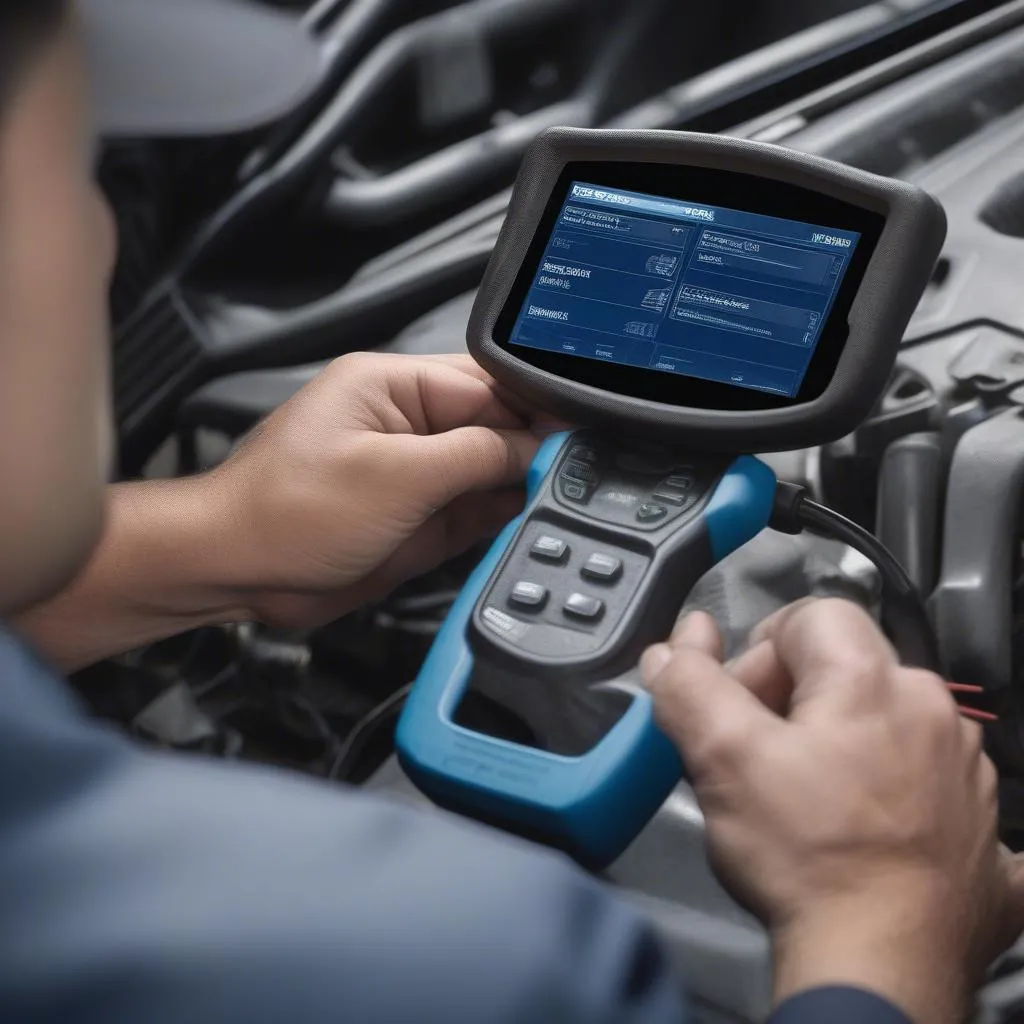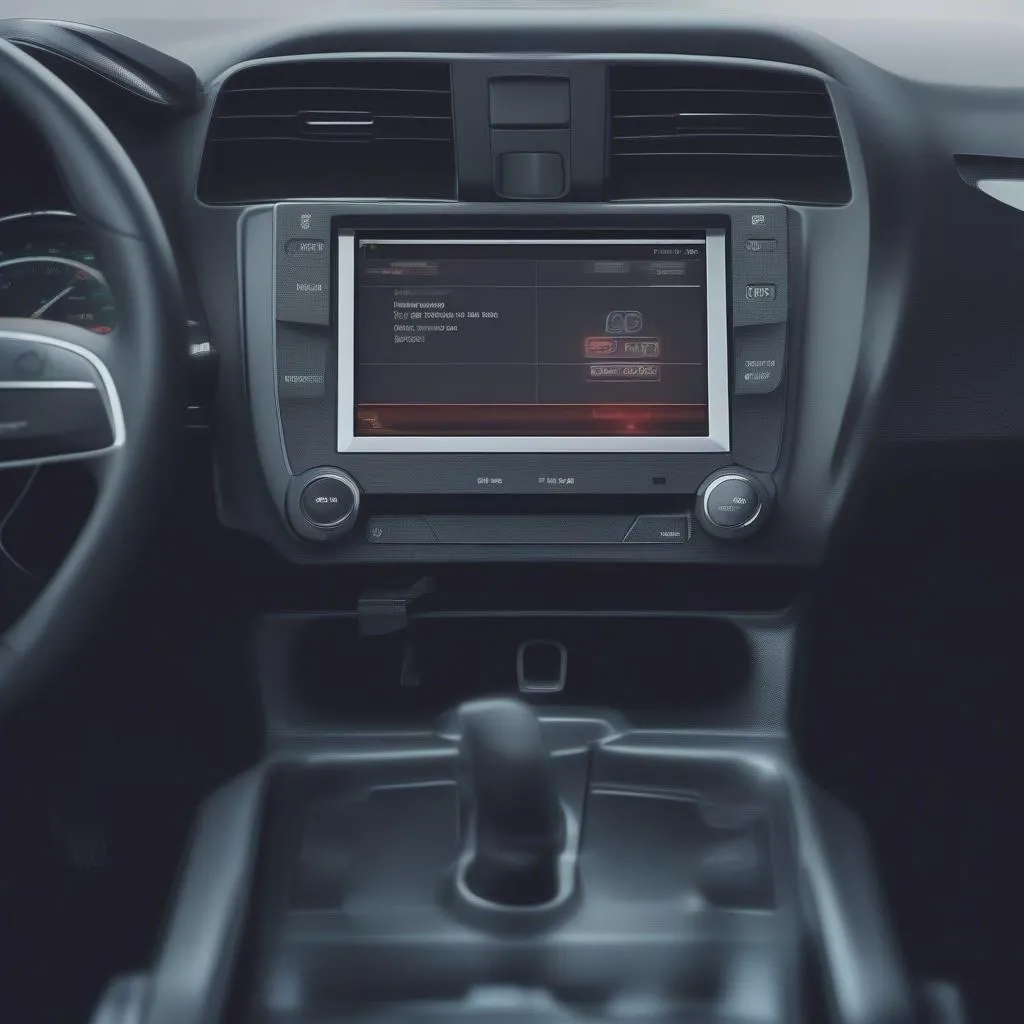Imagine this: You’re a skilled mechanic in a bustling Detroit garage, wrench in hand, ready to tackle any engine problem. Suddenly, a sleek European car rolls in with a flashing dashboard light. The owner explains they just replaced a faulty module, but now the new one needs programming. You think, “What scan tool can program modules, especially on a sophisticated car like this?”
That, my friend, is a question more and more mechanics are facing these days. Vehicles are becoming rolling computers, and knowing how to program modules is becoming essential.
Understanding the Question: More Than Just a Scan Tool
Before we jump into specific tools, let’s break down why this question is so important:
For the Mechanic: Gone are the days of simple repairs. Modern vehicles require specialized tools to communicate with and program the various Electronic Control Units (ECUs) or modules that control everything from engine timing to airbag deployment.
For the Tech-Savvy Car Owner: As technology advances, some car owners might attempt DIY repairs. Knowing what’s involved in module programming emphasizes the complexity of these systems and the need for specialized tools and knowledge.
The Business Side: For garages, investing in the right scan tool that can program modules can be a game-changer. It means taking on more complex jobs, attracting new customers with high-end vehicles, and ultimately, boosting revenue.
Answering the Call: Scan Tools Up for the Task
So, what scan tool CAN program modules? Here’s a breakdown:
1. OEM-Level Tools: These are the gold standard, often used by dealerships. They are designed for specific car manufacturers like BMW, Audi, or Mercedes-Benz. While incredibly powerful, they tend to be the most expensive option.
- Example: A mechanic in Germany specializing in Mercedes might use the XENTRY Diagnostics kit to program modules for various Mercedes models.
2. Professional-Grade Aftermarket Scanners: These tools offer a wider range of vehicle coverage and functionalities compared to basic code readers. Many can perform module programming, especially for common modules like Engine Control Modules (ECMs) and Transmission Control Modules (TCMs).
- Example: A mechanic in a busy Chicago garage might use an Autel Maxisys Elite or a Launch X431 to program modules for a variety of American, European, and Asian vehicles.
3. Specialized Programming Tools: These focus specifically on programming, often for specific systems like airbag control modules or immobilizers.
- Example: An auto electrician in London specializing in BMWs might use a tool like the Autologic for in-depth programming and diagnostics on BMW’s complex electrical systems.
**mechanic-using-scan-tool|Mechanic Using Scan Tool to Program a Car Module|A mechanic uses a scan tool to program a car module, demonstrating the advanced technology used in modern vehicles. The scan tool is connected to the car’s diagnostic port, and the mechanic is carefully selecting options on the tool’s screen. The car’s dashboard is lit up, indicating communication between the scan tool and the car’s systems.**
Choosing the Right Tool: Factors to Consider
Finding the perfect scan tool is like finding the right wrench – it depends on the job! Here’s what to think about:
- Vehicle Coverage: Do you primarily work on Ford trucks in Texas, or do you see a mix of vehicles from around the world?
- Budget: Tools range from a few hundred dollars to several thousand.
- Features: Do you need basic programming capabilities or advanced functions like key coding and ECU flashing?
Pro Tip from John Miller, Automotive Technology Instructor at Southern California Technical Institute:
“Always research the latest software updates for your scan tool. Manufacturers regularly release updates to expand vehicle coverage and functionality, including programming capabilities.”
Beyond the Tool: Knowledge is Power
Having the right scan tool is just one part of the equation. Successfully programming modules requires a deep understanding of:
- Vehicle Electrical Systems: You need to know how modules communicate with each other and the potential risks involved in reprogramming.
- Software and Updates: Manufacturers frequently release software updates for modules.
- Safety Precautions: Improper programming can lead to malfunctions. Always follow safety protocols and refer to manufacturer instructions.
Common Questions About Module Programming:
Q: Can I use any scan tool to program any module?
A: Unfortunately, no. The compatibility between scan tools and modules varies greatly. It depends on the tool’s software, the vehicle manufacturer, and the specific module. Always consult your scan tool’s documentation and vehicle-specific repair information.
Q: I accidentally interrupted a module programming session. What should I do?
A: This can be serious. Immediately stop and do NOT disconnect the tool or turn off the ignition. Consult your scan tool’s instructions or contact the tool manufacturer’s technical support for guidance.
Q: Can module programming void my car’s warranty?
A: It’s possible, but it depends on the situation. Unauthorized modifications or using non-approved tools might void your warranty. Check your warranty terms or consult with your dealership.
Explore More: Related Topics
Interested in learning more about scan tools and automotive diagnostics? Check out these articles:
- Auto Enginuity Scan Tool: A Comprehensive Review
- Finding the Cheapest Bi-Directional Scan Tool for Your Needs
- The Best Professional Car Diagnostic Tools on the Market
Need Help? We’re Here for You!
Feeling overwhelmed by the world of automotive programming? Don’t worry! Our team of auto repair experts is just a message away. Contact us on WhatsApp at +84767531508 for assistance with diagnostics, module programming, and more. We offer 24/7 support to help you get those tricky repairs done right.
**different-types-of-scan-tools|Different Types of Scan Tools for Automotive Diagnostics|This image displays various types of scan tools used for automotive diagnostics. It highlights the diverse range of tools available, from basic code readers to advanced professional-grade scanners. Each scan tool serves different purposes and caters to specific needs, providing mechanics with the right tools for the job.**
Remember, in the ever-evolving world of automotive technology, the right knowledge and tools are your keys to success. Keep learning, keep exploring, and never stop turning wrenches!


